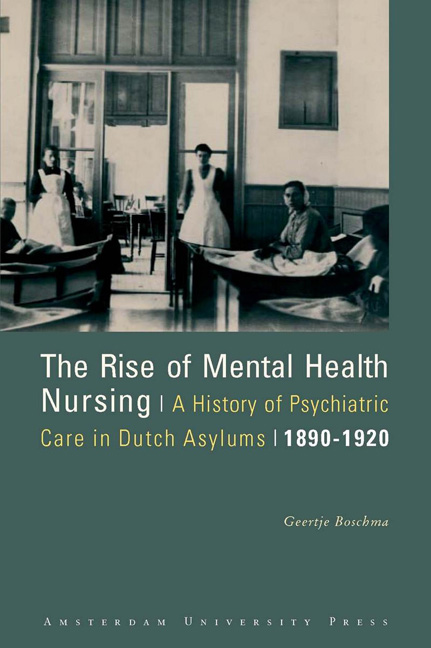Book contents
- Frontmatter
- Contents
- Acknowledgments
- Introduction
- Chapter I Asylum Reform Ideals: Personnel Matters
- Chapter II The Ideal of a Mental Hospital
- Chapter III Female Compassion: Mental Nurse Training Gendered Female
- Chapter IV The Burdensome Task of Nurses
- Chapter V Negotiating Class and Culture
- Chapter VI The Marginalization of Male Nurses
- Chapter VII Controversy and Conflict over the Social Position of Nurses
- Conclusion: The Politics of Mental Health Nursing
- Appendix
- Notes
- List of Illustrations
- List of Abbreviations
- List of Archives
- Bibliography
- Index
Chapter IV - The Burdensome Task of Nurses
Published online by Cambridge University Press: 28 January 2021
- Frontmatter
- Contents
- Acknowledgments
- Introduction
- Chapter I Asylum Reform Ideals: Personnel Matters
- Chapter II The Ideal of a Mental Hospital
- Chapter III Female Compassion: Mental Nurse Training Gendered Female
- Chapter IV The Burdensome Task of Nurses
- Chapter V Negotiating Class and Culture
- Chapter VI The Marginalization of Male Nurses
- Chapter VII Controversy and Conflict over the Social Position of Nurses
- Conclusion: The Politics of Mental Health Nursing
- Appendix
- Notes
- List of Illustrations
- List of Abbreviations
- List of Archives
- Bibliography
- Index
Summary
Uw’ hand, uw’ zachte hand, moet zeker zijn en vast,
Door geen gebaar van die gij helpen moet, verrast.
Grijp moedig aan, maar wil 't niet overdrijven,
Doortastend moet ge zijn, maar nochtans VROUWELIJK blijven.
[Your hand, your tender hand, must be confident and firm,
Not surprised by any gesture of the person in your care.
Take up the matter bravely, but do not overact,
Vigorous you have to be, while still remaining FEMININE.]
Maria E. BeetsHenriëtte Koffijberg, head nurse at the Veldwijk asylum, used these poetic words of her colleague Maria Beets to explain to her female pupils the behavior that was expected of them on the ward. She quoted the poem in an instruction booklet on mental nursing, which she had written for the purpose of training at Veldwijk. The booklet strongly emphasized the importance of female character traits and a respectable morality. It reflected the idea that disciplinary nurse training enhanced the female qualities that would bring about the cleanliness, rest, and order expected on the wards. It was most likely the first lecture book written by a female mental nurse.
Koffijberg, who was born in Amsterdam in 1879, began her career as a nurse at Veldwijk in 1898, at age nineteen. She soon became a head nurse (housemother) of a pavilion for disturbed patients, initially of a lower-class pavilion but later of one for first- and second-class patients. In 1909 the board appointed her to direct “The Boschhoek”, a new preparatory training school for female nurses at Veldwijk, which was a unique endeavor. The boundaries between nursing and other female leadership tasks were indistinct, however, and in 1914 she succeeded her colleague Mrs. M. Th. Kassies-de Buisonjé as the housemistress of household affairs. In 1918, she died suddenly after a short illness. Koffijberg was a religious, bright, and sophisticated woman with an open mind. She loved poetry and language. She was a member of the Dutch Christian Literary League and translated books she thought were interesting for nurses. Her position reflected the career opportunities for middleclass women opening up in asylum nursing.
Koffijberg embraced the same ideology underlying the psychiatrists’ ideal that with a refined attitude the nurse would be able to meet all medical expectations, both in terms of applying somatic treatments and in guiding quiet patients in work and leisure.
- Type
- Chapter
- Information
- The Rise of Mental Health NursingA History of Psychiatric Care in Dutch Asylums, 1890–1920, pp. 113 - 140Publisher: Amsterdam University PressPrint publication year: 2003



